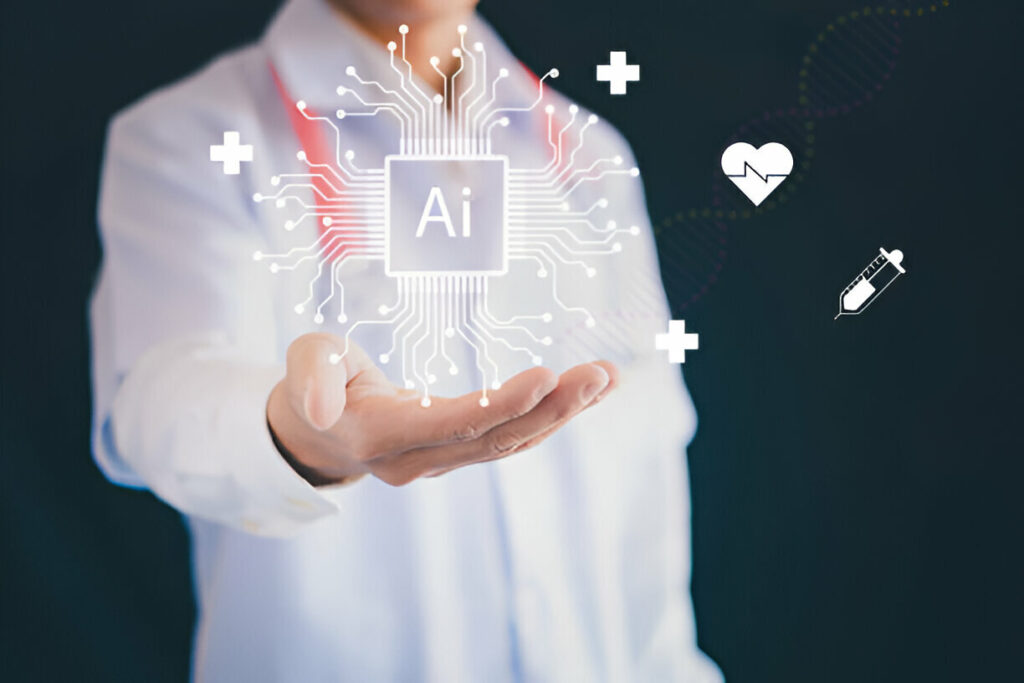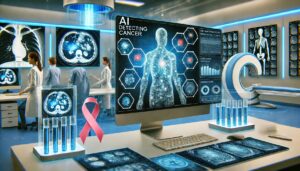AI in healthcare has evolved rapidly over the past decade, and by 2025, it has become an essential component of modern medicine. From intelligent diagnostics to real-time remote monitoring, AI is streamlining processes, enhancing decision-making, and improving patient outcomes. As healthcare systems around the world face growing demands, AI is proving to be the game-changer the industry needs.
In this article, we’ll explore how AI in healthcare is transforming patient care, especially through personalized treatments, enhanced diagnostics, and the rise of Telemedicine.
Revolutionizing Diagnostics with AI in Healthcare
One of the most impressive applications of AI in healthcare is in diagnostic accuracy. Traditional diagnostic methods often rely heavily on manual interpretation, leaving room for human error. AI-powered tools, however, can analyze large sets of data, such as imaging scans and blood test results, with remarkable precision.
In 2025, hospitals are using machine learning algorithms to detect conditions such as cancers, strokes, and heart diseases in their early stages. These systems flag abnormalities faster than ever, enabling doctors to intervene earlier and improve patient outcomes.
Personalized Care Plans and Predictive Analytics
AI is no longer just reactive—it’s predictive. Through the analysis of patient records, genetic profiles, and lifestyle data, AI in healthcare can anticipate potential health risks before symptoms even appear. This predictive capability helps doctors design personalized treatment plans that are more effective and tailored to individual patients.
For example, if an AI system predicts that a patient is at high risk of developing Type 2 diabetes, it can suggest early lifestyle changes, dietary recommendations, and periodic testing. This level of proactive care is changing how we approach chronic conditions.
The Role of AI in Telemedicine: Enhancing Access to Care
Telemedicine: A Key Component of AI-Driven Healthcare
The synergy between AI in healthcare and Telemedicine is perhaps one of the most transformative developments in patient care. In 2025, AI-enhanced Telemedicine allows patients to consult doctors without leaving their homes. Intelligent virtual assistants conduct preliminary interviews, collect symptoms, and even provide recommendations based on real-time health data.
This dramatically reduces waiting times and improves the efficiency of healthcare systems. AI triage systems direct patients to the right specialist, ensuring they get the help they need faster and more accurately.
Real-Time Monitoring Through Telemedicine
Telemedicine platforms, powered by AI, allow for continuous patient monitoring through wearable devices. These devices track vital signs like heart rate, oxygen levels, and blood pressure, sending data in real-time to healthcare providers.
AI algorithms interpret this data to detect anomalies and alert medical professionals if intervention is required. Patients with chronic conditions such as heart disease or COPD are benefiting immensely from this non-invasive, around-the-clock care. The result? Fewer hospitalizations, reduced medical costs, and a higher quality of life.
AI-Powered Virtual Assistants in Telemedicine
Virtual assistants are making Telemedicine more accessible and interactive. These AI-driven bots can schedule appointments, remind patients to take medications, and provide basic health information. For instance, an elderly patient living alone can receive medication reminders and dietary tips from an AI assistant that interacts through voice commands.
This technology helps bridge the gap between occasional doctor visits and daily healthcare needs—ensuring continuity of care for patients who need it most.
Enhancing Emergency Response and Critical Care
In emergency medicine, speed can mean the difference between life and death. AI in healthcare is revolutionizing how emergency teams respond to critical situations. AI-powered dispatch systems now assess the severity of incoming calls, prioritize patients based on need, and suggest the nearest facilities with available resources.
Hospitals use AI to prepare ER teams in advance, ensuring that the right specialists and equipment are available when the patient arrives. This coordinated, data-driven approach reduces wait times and improves survival rates for critical patients.
AI in Mental Health: Supporting Emotional Well-Being
Mental health care is also benefiting from AI in healthcare. In 2025, AI-powered chatbots and mobile apps offer immediate support for individuals struggling with anxiety, depression, or PTSD. These tools use natural language processing (NLP) to converse with users, monitor emotional cues, and provide CBT-based interventions.
One example is Woebot, a digital companion that helps users track their moods and offers mental health exercises. These platforms are not replacements for therapists, but they provide valuable interim support—especially in regions where mental health services are scarce.
Administrative Automation: Letting Doctors Focus on Patients
Administrative burdens are a major challenge in modern healthcare. Doctors often spend hours on documentation, billing, and compliance. AI in healthcare is now handling much of this back-office work. Tools like voice-to-text transcription, smart scheduling assistants, and automated billing systems are streamlining these processes.
This means doctors can spend more time doing what they do best—caring for patients. And for hospitals, it translates into increased efficiency, fewer errors, and reduced costs.
Ethical Considerations and Data Privacy
As the use of AI in healthcare expands, ethical and data privacy concerns are growing. In 2025, stringent regulations ensure that AI tools comply with patient confidentiality laws such as HIPAA and GDPR. AI systems must be transparent, explainable, and auditable.
Patients are also more informed about how their data is used. They have the right to opt in or out of AI-driven programs, and healthcare institutions are investing heavily in cybersecurity to protect sensitive health information.
Telemedicine and AI: Closing the Gap in Rural Healthcare
How Telemedicine Is Bridging the Rural-Urban Divide
Access to healthcare has historically been limited in rural and remote areas. AI in healthcare, especially when integrated with Telemedicine, is closing this gap. Patients in rural communities now consult specialists virtually, share diagnostic reports, and receive prescriptions without traveling miles to urban centers.
AI tools can translate local dialects, work in low-bandwidth settings, and even assist non-specialist health workers with decision support. This democratization of healthcare is one of AI’s most impactful contributions.
The Future of Patient-Centered Care
As we look ahead, it’s clear that AI in healthcare is here to stay. The technology is not replacing human doctors—it’s empowering them. With AI’s help, healthcare is becoming more personalized, accessible, and proactive. Patients are no longer passive recipients of care but active participants in their health journeys.
In the future, we can expect even more integration between AI, wearable technology, and Telemedicine, leading to smarter care delivery, better resource management, and healthier populations worldwide.
Outbound Link
To see how AI is impacting hospitals globally, visit World Health Organization’s Digital Health Page.
Final Thoughts
The influence of AI in healthcare in 2025 is undeniable. From enhancing diagnostics to revolutionizing Telemedicine, AI is at the heart of a new era in patient care. Hospitals, clinics, and health tech companies are all embracing this shift, focusing on patient outcomes and experience.
If used ethically and responsibly, AI has the power to eliminate inefficiencies, reduce costs, and ensure every patient receives the best care possible—no matter where they live.




